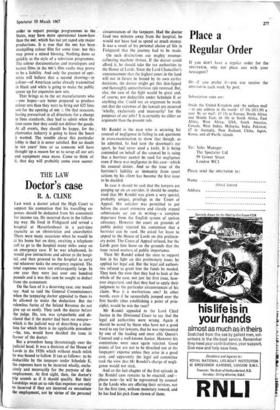Doctor's case
THE LAW R. A. CLINE
Last week a doctor asked the High Court to support his contention that his travelling ex- penses should be deducted from his assessment for income tax. He incurred them in the follow- ing way. He lived in Fishguard and served a hospital at Haverfordwest in a part-time capacity as an obstetrician and anaesthetist. There were many occasions when he would be at his home but on duty, awaiting a telephone call to go to the hospital many miles away on an emergency case. If he was telephoned, he would give instructions and advice to the hospi- tal, and then proceed to the hospital to carry out whatever tasks the emergency required. The total expenses were not extravagantly large. In one year they were just over one hundred pounds and it was this sum he sought to deduct from the assessment.
On the face of it a deserving case, one would say. And so said the General Commissioners when the taxpaying doctor appealed to them to be allowed to make the deduction. But the relentless furies of the Inland Revenue do not give up so easily. They took the doctor before the judge. He, too, was sympathetic and de- clared that if the matter had been res integra- which is the judicial way of describing a situa- tion for which there is no applicable precedent —he, too, would have decided the issue in favour of the doctor.
But a precedent hung threateningly over the judicial head. It was a decision of the House of Lords in the 1920s which without much relish he was bound to follow. It ran as follows: to be deductible by the taxpayer under Schedule E, the expenses have to be incurred wholly, exclu- sively and necessarily for the purpose of the employment. At first sight, then, the doctor's trip sounds as if it should qualify. But their Lordships went on to rule that expenses are only so incurred if they are incurred ex necessitate the employment, not by virtue of the personal
circumstances of the taxpayer. Had the doctor lived two minutes away from the hospital, he would not have had to spend so much money. It was a result of his personal choice of life in Fishguard that the journey had to be made.
On such distinctions our mighty revenue- collecting machine thrives. If the doctor could afford it, he should take the tax authorities to the House of Lords. Since the Lord Chancellor's announcement that the highest court in the land will not in future be bound by its own earlier decisions, the doctor might get this thin-lipped and thoroughly unmeritorious rule reversed. But, alas, the cost of the fight would be great and, of course, not deductible under Schedule E or anything else. Could not an argument be made out that the expenses of the lawsuit are incurred 'wholly, exclusively and necessarily' for the purposes of our jobs? It is certainly no sillier an argument than the present rule.
Mr Rondel is the man who is accusing his counsel of negligence in failing to ask questions in cross-examination to show that though, as he admitted, he had torn the doorman's ear apart, he had never used a knife. It is being contended on behalf of the counsel he is suing that a barrister cannot be sued for negligence even if there was negligence in this case—which his counsel denies. And so the issue of the barrister's liability or immunity from court actions by his client has become the first issue to be decided.
In case it should be said that the lawyers are ganging up on an outsider, it should be empha- sised that Mr Rondel was given a very special, probably unique, privilege in the Court of Appeal. His solicitor was permitted to put before the court extensive and closely argued submissions set out in writing—a complete departure from the English system of spoken advocacy. However the court on grounds of public policy rejected his contention that a barrister can be sued. He asked for leave to appeal to the House of Lords on this prelimin- ary point. The Court of Appeal refused, but the Lords gave him leave on the grounds that the issue raised matters, of public importance.
Then Mr Rondel asked the state to support him in his fight on this preliminary issue; he applied for legal aid. But the legal aid authori- ties refused to grant him the funds he needed. They took the view that they had to look at the whole of the case, not just the first issue, how- ever important, and that they had to apply their judgment to the particular circumstances of his claim. Was it a meritorious one? In other words, even if he successfully jumped over the first hurdle (thus establishing a point of prin- ciple), would he win the race?
Mr Rondel appealed to the Lord Chief Justice in the Divisional Court to say that the legal aid authorities were wrong. Again it should be noted by those who have not a good word to say for lawyers, that he was represented by one of the leading and most able Queen's Counsel and a well-known Junior. However his contentions were once again rejected. Good points of law are not to be thrashed out at the taxpayers' expense unless they arise in a good case, and apparently the legal aid committee took the view that Mr Rondel's charge of negli- gence would not stick.
And so the last chapter of the first episode in the Rondel case remains to be enacted, and— please note—he will be represented by counsel in the Lords who are offering their services, not for the first time, without monetary reward, and be has had his pick from eleven of them.






























 Previous page
Previous page